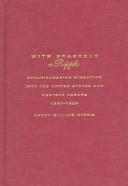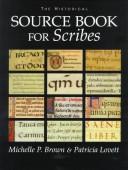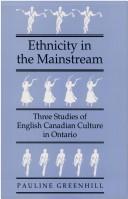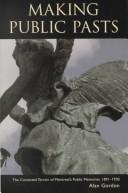| Listing 1 - 6 of 6 |
Sort by
|

ISBN: 1282855093 9786612855092 0773567232 9780773567238 0773517332 9780773517332 9781282855090 6612855096 Year: 1998 Publisher: Montreal [Que.] McGill-Queen's University Press
Abstract | Keywords | Export | Availability | Bookmark
 Loading...
Loading...Choose an application
- Reference Manager
- EndNote
- RefWorks (Direct export to RefWorks)
Using a prosopographical approach that combines descriptive exposition, quantitative tabulation, and structural analysis, Randy Widdis determines the geographical and social origins of migrants, the distance and direction of migration corridors, and geographical destinations in both the United States and Canada. The study provides a new view of the invisible Anglo-Canadian, one of the largest and least understood immigrant groups in the United States. Widdis's results show that there were many differences between Anglo-Canadians, and that their experience in the United States was much more complex than is usually assumed. With Scarcely a Ripple not only contributes to our understanding of the dynamics of intra-regional, inter-regional, and return Anglo-Canadian migration but also interprets this movement in terms of the paradox of an emerging Canadian identity and a developing integration with the United States. It offers a historical geographical perspective on a subject that, in this era of free trade and globalization, is more relevant than ever.
Canadians, English-speaking --- Canadian Americans --- Migration, Internal --- Internal migration --- Mobility --- Population geography --- Internal migrants --- Anglophone Canadians --- English-speaking Canadians --- Canadians --- Ethnology --- History. --- United States --- Canada --- Emigration and immigration

ISBN: 0802047203 080208916X 9786611992415 0802086713 1442671548 1281992410 9781442671546 9781281992413 9780802089168 9780802086716 9780802047205 6611992413 Year: 2004 Publisher: Toronto, Ont. University of Toronto Press
Abstract | Keywords | Export | Availability | Bookmark
 Loading...
Loading...Choose an application
- Reference Manager
- EndNote
- RefWorks (Direct export to RefWorks)
"Borderland Religion is effectively a borderlands study in reverse. Rather than examining the dynamics of contact between two distinct cultures in a common geographical space, or middle ground, it explores how a common culture became differentiated on either side of an international boundary line. In the process, it also illuminates the woefully neglected history of Protestantism in Quebec."--Jacket.
Calligraphy --- Eastern Townships (Québec) --- Anglophone Canadians --- English-speaking Canadians --- Cantons de l'Est (Québec) --- Protestant churches --- Canadians, English-speaking --- Protestant sects --- Christian sects --- Protestantism --- Canadians --- History --- Missions --- Church history. --- Church history --- Paleography

ISBN: 1282856901 9786612856907 0773564632 9780773564633 0773511733 9780773511736 9781282856905 Year: 1994 Publisher: Montreal : McGill-Queen's University Press,
Abstract | Keywords | Export | Availability | Bookmark
 Loading...
Loading...Choose an application
- Reference Manager
- EndNote
- RefWorks (Direct export to RefWorks)
Greenhill presents three studies from the perspective of a folklorist and within the framework of feminist analysis. Loosely linked by the theme of power and discussion of carnivalesque elements of traditional and popular culture, these studies examine immigrants' narratives about adjusting to life in Canada; Morris dancing as practised by Forest City Morris of London, Ontario; and actions and responses of promoters and residents to the development of the Shakespeare festival in Stratford, Ontario. Greenhill notes that because the English are perceived as lacking carnivalesque traditions, their position vis-à-vis other ethnic groups has been defined solely in terms of power, and demonstrates that concepts of power and entitlement are inextricably bound up in English self-definition. She concludes by examining the implications for social scientific practice of an insider studying her own culture and the political ramifications of such studies for a pluralistic, multicultural society such as Canada. Greenhill's methods, concepts, and conclusions have much to offer practitioners in the fields of folklore, Canadian studies, ethnic studies, anthropology, and women's studies.
Canadians, English-speaking --- Ethnicity --- Ethnic identity --- Group identity --- Cultural fusion --- Multiculturalism --- Cultural pluralism --- Anglophone Canadians --- English-speaking Canadians --- Canadians --- Ontario --- Canada West --- Антарыа --- Antarya --- Онтарио --- Οντάριο --- אונטריו --- Onṭaryo --- Ontarijas --- オンタリオ州 --- Ontario-shū --- オンタリオ --- Ontariu --- Онтаріо --- אנטעריא --- Onṭeryo --- Ontarėjė --- 安大略省 --- Andalüe Sheng --- 安大略 --- Andalüe --- Upper Canada --- Civilization.
Book
ISBN: 1442688289 9781442688285 9780802098818 0802098819 1442693053 Year: 2008 Publisher: Toronto Buffalo University of Toronto Press
Abstract | Keywords | Export | Availability | Bookmark
 Loading...
Loading...Choose an application
- Reference Manager
- EndNote
- RefWorks (Direct export to RefWorks)
In this provocative study of the task of English-Canadian philosophy, Ian Angus contends that English Canada harbours a secret and unofficial dream of self-rule that is revealed through critiques of empire. Looking at the main tensions between local dwelling and the globalized market, Identity and Justice shows how contemporary society's reactions to technological advances and a world market economy have produced increasingly isolated individuals and prevented the emergence of a coherent community based on a universalizing philosophy.Stressing the importance of regionalism and postcolonial understandings, Angus argues that Canada requires a philosophy of independent parts through a conception of universality that subordinates rulership to a negotiation between diverse communities. Through discussion of the work of prominent Canadian thinkers, notably Harold Innis, John Porter, George Grant, and Marshall McLuhan, Angus identifies and explores key themes that define the distinctiveness of English Canada, primarily those related to power and empire, dominant and innovative modes of perception and thought, transportation, communication, community, ethnicity, and collective action.A penetrating examination of some of Canada's national myths and the phenomenology of locality in the twenty-first century, Identity and Justice is a groundbreaking critique and recovery of English Canadian social and political thought.
Canadians, English-speaking. --- Multiculturalism --- Group identity --- Dependency. --- Center-periphery relations --- Core-periphery relations --- Dependent nations --- Colonies --- Imperialism --- Collective identity --- Community identity --- Cultural identity --- Social identity --- Identity (Psychology) --- Social psychology --- Collective memory --- Cultural diversity policy --- Cultural pluralism --- Cultural pluralism policy --- Ethnic diversity policy --- Social policy --- Anti-racism --- Ethnicity --- Cultural fusion --- Anglophone Canadians --- English-speaking Canadians --- Canadians --- Government policy --- Canada --- Politics and government.
Book
ISBN: 1442617179 1442617187 1442648538 9781442617179 9781442648531 Year: 2016 Publisher: Toronto Buffalo London
Abstract | Keywords | Export | Availability | Bookmark
 Loading...
Loading...Choose an application
- Reference Manager
- EndNote
- RefWorks (Direct export to RefWorks)
Diane Gerin-Lajoie uses survey data and the life stories of Anglophone teachers to illustrate the social practices which connect them with their linguistic, cultural, and professional identities.
Canadians, English-speaking --- Teachers --- Social conditions. --- Language. --- Faculty (Education) --- Instructors --- School teachers --- Schoolteachers --- School employees --- Anglophone Canadians --- English-speaking Canadians --- Canadians --- Québec. --- Canada East --- Kebek (Province) --- Kébeki (Province) --- Kebekio (Province) --- Kebekku (Province) --- Kebekku-sh --- Kebekkush --- Kempek (Province) --- Kui bei ke (Province) --- Kuibeike (Province) --- Kupaik (Province) --- Kvebek (Province) --- Kvebeka (Province) --- Kvebekas (Province) --- Kvebeks (Province) --- Ḳṿibeḳ (Province) --- Kʻwebek-ju --- Kʻwebek (Province) --- Lower Canada --- Pravintsyi͡a Kvebek --- Province de Québec --- Province of Québec --- Provincia Québec --- Provinsie van Quebec --- Quebecum (Province)

ISBN: 1282859595 9786612859595 0773569588 9780773569584 0773522549 9780773522541 9781282859593 6612859598 Year: 2001 Publisher: Montreal Ithaca McGill-Queen's University Press
Abstract | Keywords | Export | Availability | Bookmark
 Loading...
Loading...Choose an application
- Reference Manager
- EndNote
- RefWorks (Direct export to RefWorks)
Gordon shows that while individual memory is crucial to establishing and maintaining identity, public memory is contested terrain - official customs and traditions, monuments, historic sites, and the celebration of anniversaries and festivals serve to order individual and collective perceptions of the past. Public memory is therefore the product of competitions and ideas about the past that are fashioned in a public sphere and speak primarily about structures of power. It conscripts historical events in a bid to guide shared memories into a coherent narrative that helps individuals negotiate their place in broader collective identities. The contest over public memories involves an exclusiveness that packages "others" according to the ideological preferences of the dominant cultures. Gordon shows that in Montreal ethnic, class, and gender voices strove to stake their own claims to legitimacy. Rather than acknowledging a single past, Montreal's many publics made and celebrated many public memories.
Canadians, English-speaking --- French-Canadians --- Memory --- Monuments --- Public history --- National characteristics, Canadian. --- Canadian national characteristics --- Applied history --- History --- Retention (Psychology) --- Intellect --- Psychology --- Thought and thinking --- Comprehension --- Executive functions (Neuropsychology) --- Mnemonics --- Perseveration (Psychology) --- Reproduction (Psychology) --- Canadians, Francophone --- Canadians, French-speaking --- Francophone Canadians --- French-speaking Canadians --- Canadians --- Anglophone Canadians --- English-speaking Canadians --- Historical monuments --- Architecture --- Sculpture --- Historic sites --- Memorials --- Public sculpture --- Statues --- Social conditions. --- Ethnic identity. --- Social aspects --- History. --- Political aspects --- Montréal (Québec) --- Manrėalʹ (Québec) --- Marianopolis (Québec) --- Mengteli'er (Québec) --- Monrealʹ (Québec) --- Monreāla (Québec) --- Monrealis (Québec) --- Mons Regalis (Québec) --- Mons Regius (Québec) --- Mont-Royal (Québec) --- Montoriōru (Québec) --- Montreali (Québec) --- Monṭreʼol (Québec) --- Montʻŭriol (Québec) --- Mūntiryāl (Québec) --- Ville de Montréal (Québec) --- Μόντρεαλ (Québec) --- Манрэаль (Québec) --- Монреал (Québec) --- Монреаль (Québec) --- Монтреал (Québec) --- מאנטרעאל (Québec) --- מונטריאול (Québec) --- مونتريال (Québec) --- モントリオール (Québec) --- 蒙特利尔 (Québec) --- 몬트리올 (Québec) --- Ethnic relations. --- Montreal (Quebec)
| Listing 1 - 6 of 6 |
Sort by
|

 Search
Search Feedback
Feedback About UniCat
About UniCat  Help
Help News
News